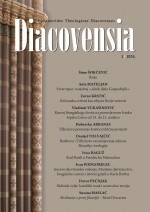»MONARHIJSKE« TENDENCIJE U DANAŠNJOJ TEOLOGIJI NA POZADINI RASPRAVA NAKON NICEJE
MONARCHICAL TENDENCIES IN THE MODERN THEOLOGY FOUNDED UPON THE DEBATES SUBSEQUENT TO THE COUNCIL OF NICAEA
Author(s): Gisbert GreshakeContributor(s): Ivan Ivanda (Translator)
Subject(s): Christian Theology and Religion, Comparative Studies of Religion, History of Religion
Published by: Katolički bogoslovni fakultet u Đakovu
Keywords: Monarchianism; Trinity; Nicaea; Neo-Arianism; Homoousians; Rahner; Barth; Pesch; Schoonenberg; Vorgrimler; Küng;
Summary/Abstract: The article commences with the fundamental thesis that the Council of Nicaea in 325 AD resulted in two opposed positions: Homoousians and Neo-Arians. Both positions had the same respective point in common: the emphasis on unconditional God’s monarchy, be it by subordinating the Logos and Pneuma to one absolutely transcendent Person of God, or be it by reducing the Son and the Father to the status of the modes, i.e. ways that one Godly substance appears in. The issue of Monarchianism continues also in the modern Trinitarian theology. Certain ‘Monarchian’ tendencies are thus presented in the modern theology: Rahner, Barth, Pesch, Schoonenberg, Vorgrimler, Küng, Simonis, Ohlig. Finally the article states the shared arguments of the Trinitarian theologies: infusion of philosophy into theology, truthfulness to the Bible, God’s mysteriousness, the impossibility of the idea of God’s self-announcement in the world.
Journal: Diacovensia: teološki prilozi
- Issue Year: 19/2011
- Issue No: 1
- Page Range: 75-92
- Page Count: 18
- Language: Croatian

